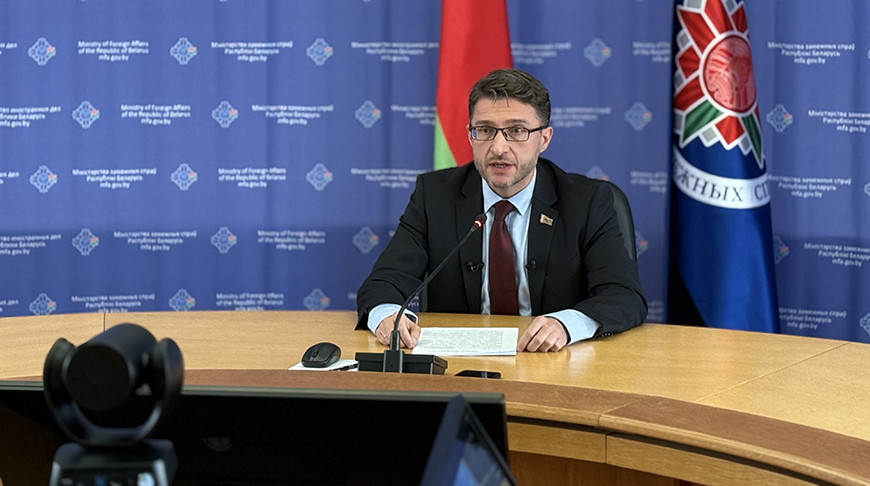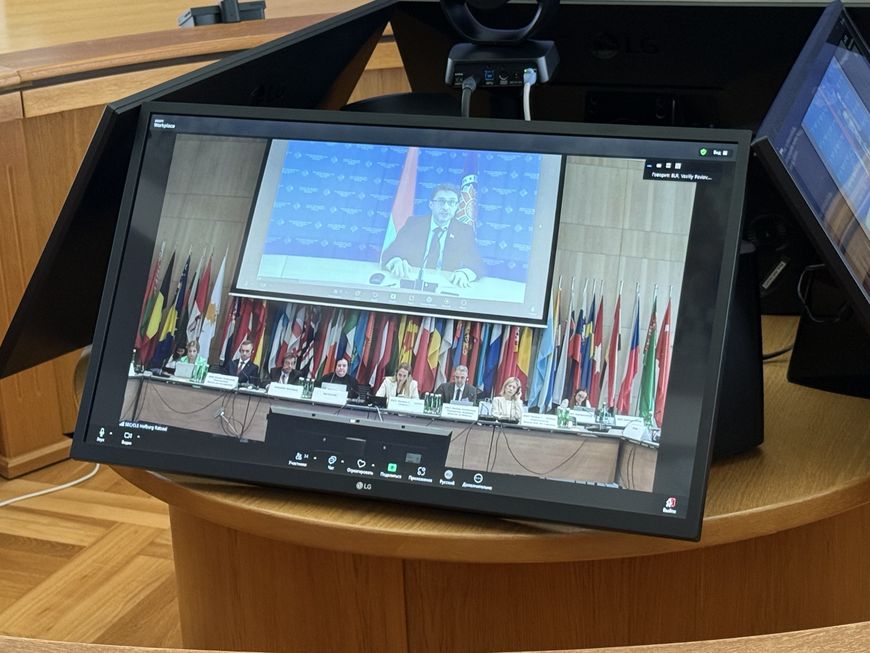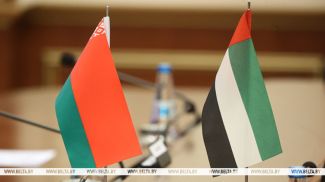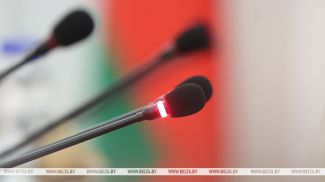
Vasily Pavlov. MFA photo
MINSK, 9 October (BelTA) - Belarus intends to remain a party to the Treaty on Open Skies despite challenges and the politicization of the situation by some countries, Vasily Pavlov, Head of the Division of International Security of the Directorate General for Multilateral Diplomacy at the Ministry of Foreign Affairs of Belarus, aid during the 5th Review Conference of the Open Skies Treaty, BelTA has learned.
The diplomat noted that the treaty, which was developed in the early years after the end of the Cold War, was an important part of the pan-European security system. According to him, the document made a significant contribution to ensuring transparency in the military sphere across the region from Vancouver to Vladivostok. Belarus faithfully contributed to the implementation of the treaty and continues to participate in the meetings of the Open Skies Consultative Commission (OSCC) and its working groups as a member of the group of participating countries.
“The deep crisis in the international relations system and the disregard for the principle of indivisible security have led to a significant erosion and, in some cases, to the complete degradation of international instruments related to non-proliferation, disarmament, and arms control,” Vasily Pavlov stated.
“The withdrawal of the United States from the Open Skies Treaty, followed by Russia’s decision to leave, not only reduced the treaty’s area of application by 80% but also significantly undermined its viability,” he continued. “The withdrawal of two key participants and the termination of the Belarus-Russia group of participating countries created an entirely new, unprecedented situation for us. Without its own observation aircraft, Open Skies infrastructure, or trained personnel, Belarus must now undertake a wide range of measures to participate in the treaty independently, against the backdrop of a radically altered military-political landscape in Europe and growing security imbalances.”
The diplomat noted that under the current circumstances, many would prefer Belarus to withdraw from the Open Skies Treaty, and some states may even be considering ending their own participation.
“But Belarus opposes such a course of action,” Vasily Pavlov emphasized. “Our position is not driven by the added value of the Open Skies Treaty for our national interests. Our motivation is the desire to preserve this instrument of confidence‑building within the broader system of interlinked treaties and agreements on arms control and confidence- and security-building measures (CSBMs) in the OSCE area, to which we remain committed. This is precisely why Belarus has sought, and continues to seek, to preserve the Treaty on Conventional Armed Forces in Europe, despite all its shortcomings and outdated provisions.”
The diplomat remarked that some states parties to the treaty have been advancing politicized and biased narratives against Belarus, including regarding its independent participation in the Open Skies Treaty. In this context, Vasily Pavlov emphasized that preparations for Belarus’ independent participation require time, substantial financial, organizational, and human resources, and, above all, constructive and effective cooperation with other states parties, both within the OSCC and on a bilateral basis.
“Addressing this issue at the OSCC in December 2021, Belarus declared its readiness for equal cooperation under the treaty without discrimination or politicization, and with due regard for each other’s interests and concerns. We expected assistance and support from other members of the Open Skies community. Such assurances were indeed voiced at the OSCC, when we were thanked for our commitment to the treaty,” the diplomat stressed.
He recalled that Belarus had repeatedly approached several Open Skies Treaty states parties, in particular Germany and Romania, requesting information on the possibility of using an observation aircraft, the cost of leasing, and the provision of services for organizing and conducting observation flights. “In response, we were told that dialogue with Belarus on this matter was impossible under the current military-political circumstances,” Vasily Pavlov said.

He pointed out that NATO member states, the overwhelming majority of which are parties to the treaty, have frozen cooperation with Belarus in the field of arms control and CSBMs, completely suspended air traffic with Minsk, imposed unlawful restrictions on Belarusian air carriers, and effectively closed their airspace. “How can we exercise the right to conduct observation flights guaranteed by the treaty when the skies are closed to Belarus, military contacts are completely severed, and all our proposals to resume dialogue in the politico-military sphere, as well as gestures of goodwill, are ignored or rejected?” the diplomat asked rhetorically.
He added that the politically charged, confrontational statements made by some delegations at the conference, regrettably, only confirmed this point.
According to him, Belarus will continue to assess the situation surrounding the Open Skies Treaty and the approaches of its member states to cooperation with Belarus, both within the treaty framework and in the broader context of arms control and CSBM mechanisms in the OSCE area, as well as in civil aviation.
“The Belarusian side has repeatedly stressed that the effectiveness of cooperation under the Open Skies Treaty will determine not only the prospects for Belarus’ further independent implementation of the treaty, but also the future of the treaty as a whole,” the diplomat emphasized. “We once again call for an end to rhetoric and actions that escalate tensions and undermine the security architecture in the OSCE area, and for a return to professional and mutually respectful dialogue on conventional arms control and CSBMs. This is precisely why Belarus continues to remain at the OSCC table.”
The Open Skies Treaty was signed in Helsinki in 1992 by representatives of 23 OSCE states. The document permits unarmed reconnaissance aircraft to conduct observation flights over the territories of the signatory states.
MFA photo













